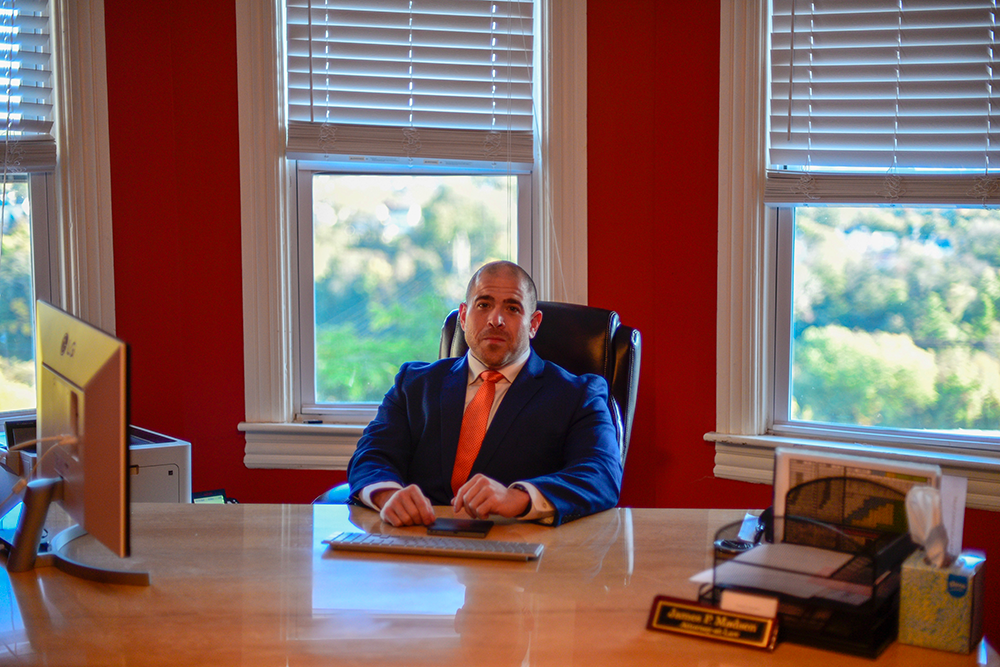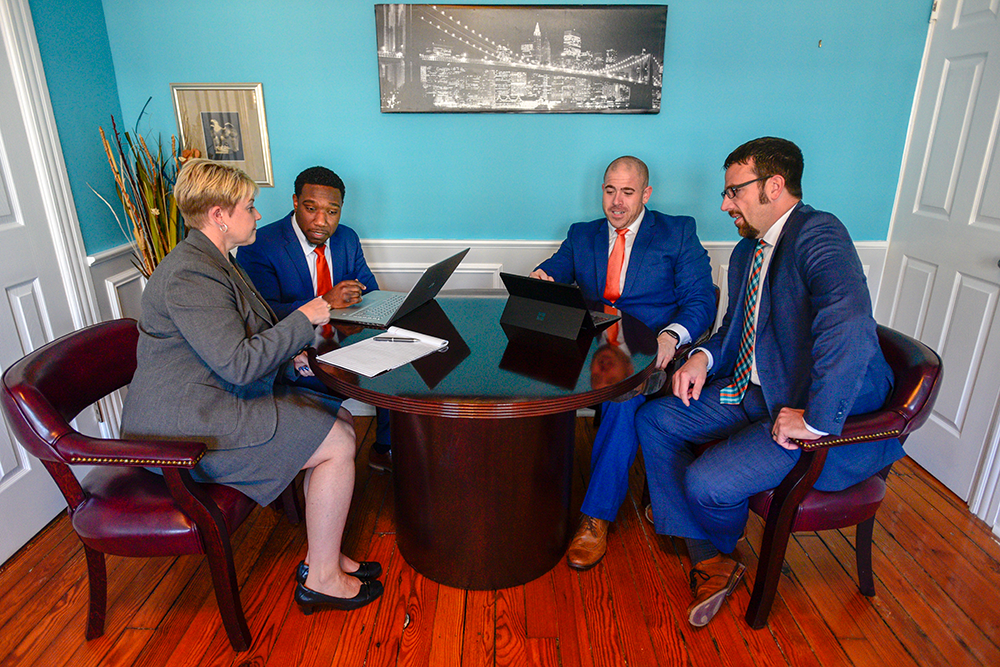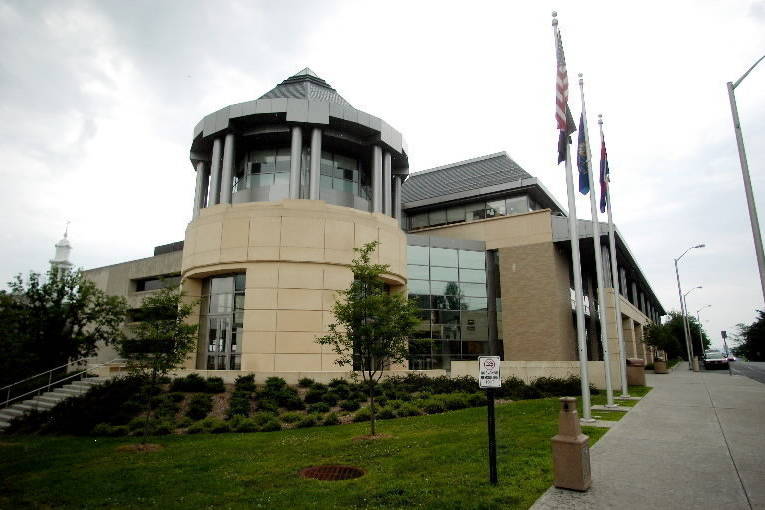Lehigh Valley Personal Injury Lawyers
Car accident and Slip & Fall lawyers in Allentown, Bethlehem & Easton
Recovering from an injury can be a long and excruciating process, both physically and financially. This is especially true when the injury was no fault of your own. If you were hurt due to the recklessness or negligence of another person or corporation, Pennsylvania law may allow you to receive compensation for your medical expenses, pain and suffering and lost wages. Our personal injury attorneys have collected hundreds of thousands of dollars for our clients. Whether it’s an automobile accident or work related injury, our injury lawyers will help make you whole.
Personal Injury Attorneys
Our personal injury lawyers handle a wide range of injury claims including auto accidents, we do not do med mal premises liability and insurance bad faith claims. All of our personal injury attorneys have extensive trial experience. Our trial experience often allows us to reach favorable settlements for our clients without forcing them to relive the events through a long drawn out trial. However, when the opposing party is unwilling to offer favorable terms, rest assured that our personal injury attorneys will leave no stone unturned at trial.
Our Lehigh Valley personal injury attorneys concentrate in the following areas:
• Auto Accidents
• Negligently Inflicted Burns
• Construction Accidents
• Dog Bites
• Loss of Consortium
• Motorcycle Accidents
• Slip & Fall
• Trucking Accidents
• Workplace Injuries
• Wrongful Death
Car Accident Lawyers
Car accident cases in particular can often result in a favorable outcome for our personal injury clients without requiring a full and complete trial. A car accident lawyer can help you understand the differences between full-tort and limited-tort and how they may effect your ability to collect against the other driver or their insurance company.
No fees until you win your personal injury case
Schedule a consultation today. Our attorneys operate on a contingency fee in personal injury cases. You will be liable for no fees or costs unless we collect for you. If you or a family member has been injured, call the attorneys at Spitale, Vargo, Madsen & Blair today for a consultation.

Grandparents' Custody Rights
Every family is unique, and every child is precious. Grandparents who are actively present in their grandchildren’s lives know this better than anyone. Some grandchildren may even live with a grandparent for various reasons. For example, sometimes a grandparent takes over when the child’s parent must be absent for a reason beyond their control, such as illness, military deployment, incarceration, or death. In other families, a temporary babysitting arrangement may have grown into full-time residence.
In some cases parents may welcome a grandparent’s custody request and in other cases grandparents may be forced to take legal action to obtain custody or visitation with their grandchildren.
When grandparents may file for custody in Easton, Allentown & Bethlehem
Grandparents can request physical or legal custody of a child if they already have legal status that allows them to act as the child’s parent (this is called in loco parentis) or under specified other circumstances. These circumstances are that the grandparent-child relationship began with a parent’s consent or under a court order, the grandparent is willing to assume responsibility for the child, and one of the following conditions exists:
1. The child is a dependent child,
2. The child is substantially at risk due to parental abuse, neglect, drug or alcohol abuse or incapacity, or
3. The child has resided with the grandparent for at least 12 consecutive months, excluding brief temporary absences of the child from the home, and is removed from the home by the parents, in which case the grandparents’ action must be filed within six months.
When grandparents may file for visitation
Grandparents may also request partial physical custody or supervised physical custody if the parent of the child has died, the parents have either been separated for at least six months or filed for divorce, or the child has lived with the grandparent for at least 12 months. Under these limited circumstances, the court will decide a grandparent’s right to custody based on the amount of personal contact between the child and grandparent, whether custody to the grandparent would interfere with any parent-child relationship, and again, the best interest of the child.
Lehigh Valley County Family Law Attorney Protecting Your Parental Rights And Your Child’s Best Interests
Every situation is different, but an experienced family law attorney can help find the elusive solutions to custody conflicts. We handle all child custody matters and have helped clients in Easton, Allentown and Bethlehem. Contact us for a consultation today.

Lehigh Valley Divorce Attorneys
Finding Creative Solutions While Standing Your Ground
Divorce is both an emotional separation and a financial division. Separating your marital partnership from the legal partnership is a difficult task with many complicated considerations.
Regardless of your level of income, however, we understand that you are ending a marriage and starting a new chapter of your life. We will guide you through the process, helping you put your emotions in perspective so that you can make informed decisions for yourself and your family. We represent men and women, at all levels of income, including professionals and business owners in the Allentown, Bethlehem & Easton area, Northampton & Lehigh Counties.
Looking Beyond the Here and Now
Decisions at each phase of divorce have immediate and long-term ramifications. Our experienced attorneys are adept at protecting your interests while finding creative solutions and resolving your divorce in the most expeditious manner. We aim to minimize the animosity and expense, limit the impact on your children and foster a positive parenting relationship going forward. However, if your spouse is unwilling to reach an agreement, our attorneys can pursue, if necessary, aggressive measures in order to ensure that our clients rights are fully protected.
We will address every aspect of your divorce:
• No-fault divorce
• Contested divorce
• Alimony, spousal support and alimony pendente lite
• Equitable distribution of property
• Child support and alimony
• Child custody
• Tax consequences of support, divorce and division of property
• Premarital agreements or prenuptial and cohabitation agreements
Whether you have complex issues or are seeking a no-fault divorce, or you are committed to working out an amicable agreement, we encourage you to explore collaborative divorce or mediation. Your legal interests are still protected, but in a manner that is less adversarial than traditional divorce litigation, which enables parties to address the issues that are of importance to them.
Experienced Pennsylvania Divorce Attorneys
Our Divorce Attorneys at Spitale, Vargo, Madsen & Blair have experience in divorce and family law you can rely upon. Contact us today at 610-258-3757 to arrange a confidential consultation.

Lehigh Valley Alimony Attorneys
Spousal Support
Spousal Support orders are issued to assure a reasonable living allowance for the party requiring support and the duty to provide Spousal Support is concomitant with the marital relationship and terminates with the ending of the marriage.
Alimony Pendente Lite
Alimony Pendente Lite (APL) is ordered by the court to enable a dependent spouse to maintain or defend litigation during a divorce proceeding until all economic issues are resolved and is intended to cover only the period in which the divorce proceeding may, with due diligence, be prosecuted to conclusion. Marital misconduct, while an issue in spousal support and one of the factors for post-divorce alimony, is not relevant to Alimony Pendente Lite.
When spousal support is calculated, consideration is given to whether one party has any previous obligations in child support or spousal support of a previous spouse or other children. If there are no previous children and no prior obligations to child support, the spousal support will be 40 percent of the difference between the obligor’s net monthly income and the recipient’s net monthly income. If there are minor children involved, then the income difference is reduced by the amount of child support, with that result multiplied by 30 percent to determine spousal support. The length of the marriage is also taken into consideration, as is the amount of time an obligor spends with the children.
Alimony
The purposes of alimony are to provide a dependent spouse with sufficient income and, in some instances to provide a dependent spouse with additional income where the property received in equitable distribution is insufficient to achieve economic equality between the spouses.
Pursuant to Title 23 Pa. C.S. § 3701(b) the relevant factors in determining the award of alimony, the nature, amount, duration, and manner of payment of alimony are as follows:
1. The relative earnings and earning capacities of the parties;
2. The ages and the physical, mental and emotional conditions of the parties;
3. The sources of income of both parties, including, but not limited to, medical, retirement, insurance or other benefits;
4.The expectancies and inheritances of the parites;
5. The duration of the marriage;
6. The contribution by one party to the education, training or increased earning power of the other party;
7. The extent to which the earning power, expenses or financial obligations of a party will be affected by reason of serving as the custodian of the minor child;
8. The standard of living of the parties established during the marriage;
9. The relative education of the parties and the time necessary to acquire sufficient education or training to enable the party seeking alimony to find appropriate employment;
10. The relative assets and liabilities of the parties;
11. The property brought to the marriage by either party;
12. The contribution of a spouse as homemaker;
13. The relative needs of the parties;
14. The marital misconduct of either of the parties during the marriage; the marital misconduct of either of the parties from the date of final separation shall not be considered by the court in its determinations relative to alimony;
15. The Federal, State and local tax ramifications of the alimony award;
16. Whether the party seeking alimony lacks sufficient property, including, but not limited to, property distributed under Chapter 35 (relating to property rights), to provide for the party’s reasonable needs;
17. Whether the party seeking alimony is incapable of self-support through appropriate employment.

Lehigh Valley Child Support Attorneys
Easton, Allentown & Bethlehem Child Support Lawyers
A custodial parent is entitled to child support until the child graduates from school or reaches the age of 18, whichever occurs later. If the child suffers from a serious mental or physical condition, the non-custodial parent may be liable for a longer period of time. The amount of support due in a Pennsylvania child support case is based upon the monthly earning capacity or net (after taxes) income of both parents.
How Is Income Determined based on PA Child Support Laws?
Income for Pennsylvania support purposes includes:
• Wages
• Salaries
• Overtime pay
• Commissions
• Bonuses
• Interest
• Rental income
• Retirement income
• Social Security retirement or disability payments
• Workers’ compensation
• Unemployment compensation
• Income from an interest in a business
• Entitlements to lump sum awards such as lottery winnings
Other Income and unemployed parents
If a parent has “under the table” or unreported income, this may be considered in support calculations. If a person does not have any income, but is capable of working, the parent may be assessed with an earning capacity that is equivalent to what that person could earn given their education, skills and prior employment history. Furthermore, in rare cases, illicit income and bartered services may even be considered.
Pennsylvania Child Support Guidelines
PA child support laws require Domestic Relations and the Family Courts to apply the Pennsylvania Child Support Guidelines to determine the amount of support payable to the custodial parent for the benefit of the child. The PA Child Support Guidelines are formulas that consider the parents’ income, the number of children by each parent, and other factors. In addition to the Pennsylvania Support Guideline amount, an order for child support may also require payment of a portion of other costs such as medical coverage for the dependent children, medical expenses not covered by insurance, and day care costs incurred while the custodial parent is working or going to school.

Child Custody Lawyers in Easton, Allentown & Bethlehem
Welcome to the Family Law Offices of Spitale, Vargo, Madsen & Blair
Even parents who are happily married have different views when it comes to raising their children. For parents who are divorced or who do not live together, disputes over the best interests of the child are magnified.
Our child custody lawyers are sensitive to the difficulties of co-parenting. We handle a variety of matters, but we know that few legal issues are more important or more emotionally charged than child custody. We work hard to truly understand your concerns and to achieve a favorable outcome, in and out of court.
Our Lehigh Valley child custody lawyers represents mothers, fathers and grandparents throughout the Lehigh Valley, including Monroe, Northampton and Lehigh Counties. Contact us today for a consultation.
Protecting Your Parental Rights And Your Child’s Best Interests
The first thing many clients ask is what rights they have in child custody proceedings. The best child custody lawyers take the time to explain Pennsylvania custody law and to address all your questions about the legal process. Our child custody attorneys take the time to understand your concerns and your goals so that we can determine a course of action.
We handle to following types of proceedings:
• Physical custody and legal custody
• Visitation and parenting plans
• Relocation proceedings
• Grandparents rights
• Paternity actions
• Modification of custody or support orders
• Interference with visitation rights
• Dependency, CYS, CYF and DHS matters
Understanding Child Custody
Sole physical custody is rarely awarded to a parent unless he or she can show cause such as serious drug use or child abuse. It is common for a court to award primary physical custody to one parent and partial physical custody (visitation) to the other parent.
The Pennsylvania family courts have become more and more progressive, fathers are obtaining shared physical custody in many cases. There is a presumption that dads deserve equal time if they have been actively involved in raising the child.
Disputes arise when a parent asserts primary custody without a court order and tries to limit the other parent’s access to the child. If parents cannot agree on how to split parenting time, our attorneys are prepared to litigate a favorable outcome.
Legal custody refers to decisions about the child’s schooling, health care, religious upbringing and general welfare. In most cases, both parents will share legal custody. While sole physical custody is rare, sole legal custody is an even more unlikely outcome in child custody litigation.
A parenting plan refers to the day-to-day scheduling of the co-parenting arrangements and, in some cases, which parent will make decisions regarding certain aspects of the child’s life. We can help negotiate the calendar of weekends, overnights, vacations and holidays, as well as pick-up times and other day-to-day details. We work to make the plan clear and enforceable while encouraging communication and flexibility.
Lehigh Valley Child Custody Lawyers
Every situation is different, but the best child custody lawyers can help find the elusive solutions to custody conflicts. We handle all child custody matters. Contact us for a consultation today.

Lehigh Valley Family Law Attorneys
Welcome to the Family Law Offices of Spitale, Vargo, Madsen & Blair
Our family lawyers provide services in the areas of domestic relations law including alimony, child support, custody, divorce, equitable distribution, prenuptial agreements and post-nuptial agreements and grandparent’s rights. Whether your case involves a contested separation date, equitable distribution, a PFA or LGBTQ related issues, our family law attorneys can assist you.
You can count on our family law attorneys for tailored solutions and strong representation in your custody trial, divorce hearing and child or spousal support matters. Our attorneys, collectively, have over 40 years of experience in family law and will help you through these difficult times and protect your interests in and out of court.
Northampton, Lehigh & Monroe County Divorce And Child Custody Attorneys
Whether you are at the beginning of a no contest divorce, revisiting custody orders or in a battle over child support, we can effectively handle all family law issues and disputes that arise. We represent women and men across the Lehigh Valley.
In family law litigation every case is unique. Further complicating the issues, every county is unique in how it handles family law cases. An experienced family law attorney will sit down with you and discuss your case and your goals. Goals in family law cases are as varied as the individuals involved. We will empower you to make informed decisions that address your immediate concerns while safeguarding your long-term interests.
Our Lehigh Valley Family Lawyers strive to strike a deal in negotiations to achieve a fair and practical settlement, and to reduce our clients’ legal expenses. However, sometimes litigation cannot be avoided. If litigation is necessary, our attorneys are ready to fight for you.
Nothing Matters More Than Your Family
For these important and highly personal matters, you need the best family law attorney you can find. At Spitale, Vargo, Madsen & Blair you won’t be shifted to another attorney after you hire us or get the run-around when you have questions. You will work with an accessible and responsive lawyer. More importantly, we will show you how to prepare for the future.

How is family law court different than other courts?
Family law courts have a heavy emphasis on mediation and negotiation. While you are entitled to a trial or hearing on most family law issues, you very rarely entitled to a jury trial.
Do you offer a free family law consultation?
We do not offer a, 30 minute, free consultation but rather charge a small fee to provide superior advice
Can I force the other party to pay my legal fees?
In theory, yes. But in practice this rarely happens.
How do I find the top family lawyers in the Lehigh Valley?
Shopping for the best Family Law Attorney is like shopping for anything else. The best family lawyer for you may not be the best lawyer for someone else. Some clients prefer an attorney who will drag the other party through the mud even it it is not in your best interests. Other clients prefer an attorney who can also act as their personal and emotional counselor throughout the case.
More than most other fields in the legal profession, family lawyers develop a reputation amongst their peers. If you’re looking for the best family attorney for your particular goals, ask your friends in the community about a particular family lawyer’s reputation.
How do I find a free family lawyer?
North Penn Legal Services offers free family law services in unique circumstances if you qualify as a low income individual.
Our attorneys act as pro bono family law lawyers for North Penn from time to time. However, any application for pro-bono services must be made through North Penn, not through us.
Can both parties use the same lawyer in family court?
No, both parties cannot use the same lawyer under the Pennsylvania Rules of Professional Conduct. However, counseling with both parties is highly recommended by the family courts.
Do I need a lawyer for a PA divorce?
You may get divorced without an attorney but it is not smart. You will be held to the same standard as the best divorce attorneys in the Lehigh Valley and will face a serious disadvantage, especially if the other party has a top divorce attorney knowledgeable in PA divorce law.
Can either party prevent a divorce?
If the party requesting the divorce fulfills all of the legal requirements the contesting party cannot prevent a divorce but they may stall it for over two years.
What should I do if served with a PA divorce complaint?
If you do not respond to the Pennsylvania divorce complaint, a divorce decree may be entered even without your consent and your legal rights including the right to support or division of marital assets and debts may be waived. You should contact a local divorce attorney ASAP.
Can a PA family court require marriage counseling?
Yes, the court can require marraige counseling but rarely does so unless requested by a party.
What is a no fault divorce?
Virtually all Pennsylvania divorces are not fault divorces. Yes this does not mean it is a simple process. While most divorces are no fault, adultery other issues are still defenses to support and equitable distribution.
Can a party be prevented from entering the marital residence?
Yes, but this rarely happens under PA divorce law, it is much more common under the PFA laws. However, in many cases, asking to have a spouse removed from the home may be more damaging to your case than it is useful.
How do I file for custody?
Filing for child custody requires a formal complaint be filed with the family court. In addition to the legal language the complaint must now contain a criminal background check form and a parenting plan.
The initial complaint comes with a filing fee of approximately $150, depending on the county. Afterwards, additional filings are usually free of a filing fee.
Do I need the court’s permission to relocate?
If there is a current order in place you will often need the court’s permission to move. If there is no order in place the courts are currently split on what level of permission is needed.
How do family law courts determine child custody?
When determining child custody the court must address 15 specific factors. This factors are two lengthy to list here but can be found on our custody page.
Can I request that the court appoint an attorney for a child?
Yes, but… The court can appoint a guardian ad litem, GAL, for a child and it can appoint an attorney for the child. The GAL is an attorney who’s purpose is to advocate for the child’s best interest but not for the child’s wishes. An attorney for the child advocates for the child’s wishes even if they are not in the child’s best interest. It may sound odd that these could be two different things but it happens frequently.
Do I need an attorney for child custody?
Ideally, no. But one way or another things are not ideal if a party has to resort to the court system. If the other party hires a top custody attorney and you go without an attorney you may find yourself at a serious disadvantage.
What can a child custody lawyer do for me?
A top custody attorney can guide you through the legal process and let you know the custody factors that are most important in a specific county or to a specific judge. But most importantly, the best custody lawyers will let you know when you are making mistakes. Often parents are overzealous in there custody disputes and the court will look very poorly upon this.
Do I need a lawyer to file for support?
You do not need a lawyer to file for support. In fact this is one of the very few areas of family law where you may be better off without a lawyer. However, in many cases a support lawyer may be very important.
How do I appeal a support order?
The process and number of steps in appealing a support order differs from county to county but the last step in each county is always a hearing in front of a judge. If the judge rules against you, your only option will be an uphill and expensive battle in Superior Court.
How to file for child or spousal support?
The party seeking support must file with the Domestic Relations Office in the county in which they reside.
Can I get credit for purchases made?
Generally no but there exceptions if the paying party has been paying utilities, rent and mortgage that benefits the party requesting support.
Does someone have to pay child support if they do not see the children?
Yes, these are separate legal issues in Pennsylvania except for that spending extended time with the children may actually reduce the amount of support that a person is required to pay.
How is child and spousal support determined?
Once it is determined that support appropriate in a particular case, the support is calculated using a standard mathematical formula. However, many legal issues may arise such as hidden assets, hidden income, unemployment and eligibility for support in the first place.
Can I demand receipts as to how support is being spent?
Generally no but there are some very rare exceptions.
Unemployment Lawyers for Referee Hearings in Easton, Allentown and Bethlehem
Unemployment Compensation Referee Hearing
If your Notice of Determination denied you benefits, you may appeal the determination and you will be scheduled for a UC Referee Hearing. But you must appeal the determination within 15 days from the date that Notice of Determination was mailed.
You will want the best unemployment attorneys at your referee hearing. At a referee hearing your employer will have the chance to put on evidence and refute evidence presented by you. The referee will then determine your eligibility for UC benefits based upon the evidence presented. While many employers are represented at these hearings, some are not. Of the employers that are represented, many are represented by non-attorney professionals who often lack a complete understanding of the rules of evidence. Often times an ex-employee may win an unemployment case based on evidentiary technicalities. Two prime examples of these cases are where an employer is incapable of having a urine screening admitted due to technicalities or where an ex-employee’s statements are not allowed to be introduced because they are hearsay.
Unfortunately, if your Notice of Determination found you eligible for benefits, the employer can also challenge your benefits by requesting a referee hearing.
Do I need a local unemployment attorney for Unemployment Benefits?
It used to be that many benefit seekers could win their hearing by default because the employer would not show up to the referee hearing or would not contest their claims. And employers did this for good reason, a granted unemployment claim cost them nothing. Employers paid into a government mandated unemployment fund whether they had ex-employees collecting or not.
Will my employer show up to an Unemployment Hearing?
Nothing has changed regarding the cost of granted claims to employers but the days of uncontested unemployment hearings are over. It is a sad fact that employers now vehemently defend against unemployment claims. Employers are now willing to spend large sums to fight unemployment claims. The only logical conclusion is that they do so in order to keep employees afraid of losing their jobs and working more productively.
When you’re going up against an employer who is fighting you even though they have nothing to lose, you need the best possible representation. An attorney will be able to cross-examine witnesses and establish legal arguments as to why you are entitled to UC benefits. Most of all, an attorney is skilled in the rules of evidence.
Many employers use non-attorney representatives who are incapable of introducing critical evidence if properly objected to. Two prime examples of these cases are where an employer is seeking to introduce a urine screening but cannot due to evidentiary technicalities or where an ex-employee’s statements are not allowed into evidence because your attorney properly objects to them as hearsay and the employers representative is incapable of getting around the objection.
Unemployment Compensation Attorney in the Lehigh Valley
Additionally, an attorney can file a thorough brief with the Unemployment Compensation Board of Review or Commonwealth Court. A fact which discourages referees from ruling against you. With so much riding on your initial referee hearing, it’s important to get it done right from the start. To speak with an experienced Lehigh Valley unemployment compensation benefits attorney, contact our office today.

Filing For Unemployment Benefits in Allentown, Bethlehem & Easton Pennsylvania
Filing for Pennsylvania Unemployment Compensation in the Lehigh Valley
The best unemployment attorneys will tell you to file for unemployment compensation benefits immediately after being terminated. You can file your claim on-line at the Pennsylvania Department of Labor website. While this process is fairly brief and will require some basic background information, you will then be required the continue to update the unemployment office with ongoing information.
Pennsylvania Unemployment Compensation Eligibility
You must have have earned at least $50 a week for the last 16 weeks to be eligible for unemployment benefits. You will not be eligible for Unemployment Compensation benefits if it is determined you were terminated for “willful misconduct.” You are likely also ineligible if you voluntarily quit, but not always. You must also be willing to seek employment if and when you are able.
Pennsylvania Unemployment Compensation Benefits Process
You must begin the process by filing a claim for unemployment compensation with the Pennsylvania Department of Labor. The unemployment office will then issue you a Notice of Determination which will state whether you are eligible or ineligible for UC benefits based upon their initial determination.
Common Mistakes Claimants make in the Initial Claim
People often make some mistakes when filing for unemployment. Some of these mistakes are:
• Telling the Unemployment Office that you are not able to work when, in fact, you are
• Telling the Unemployment Office that you are not willing to work when, in fact, you are
• Telling the Unemployment Office that you are not searching for employment when, in fact, you are
• Not realizing that the employer may use your statements against you
• Admitting to willful misconduct
• Not thoroughly thinking through answers
Unemployment Compensation Referee Hearing
If your Notice of Determination denied you benefits, you may appeal the determination and you will be scheduled for a UC Referee Hearing. But you must appeal the determination within 15 days from the date that Notice of Determination was mailed.
At a referee hearing you will have the chance to put on evidence and refute evidence presented by your employer. The referee will then determine your eligibility for UC benefits based upon the evidence presented. While many employers are represented at these hearings, some are not. Of the employers that are represented, many are represented by non-attorney professionals who often lack a complete understanding of the rules of evidence. Often times an ex-employee may win an unemployment case based on evidentiary technicalities. Two prime examples of these cases are where an employer is incapable of having a urine screening admitted due to technicalities or where an ex-employee’s statements are not allowed to be introduced because they are hearsay.
Unfortunately, if your Notice of Determination found you eligible for benefits, the employer can also challenge your benefits by requesting a referee hearing.
Appeal to the Unemployment Compensation Board of Review
If you are denied benefits at the referee hearing, you can further appeal this determination to the Pennsylvania Unemployment Compensation Board of Review (UCBR). The UCBR will review the record and determine if the referee’s decision was correct. The UCBR will rarely consider any additional evidence that was not presented at the referee hearing. However, your attorney my file a legal brief outlining how the referee failed to apply the law correctly.
While unemployment compensation attorney James Madsen has an excellent record of winning UCBR appeals, those wishing to appeal to the UCBR should know that the overall rate at which the UCBR overturns a referee’s decision hovers just around 10%. In many cases, the cost of a thorough appeal may not be justifiable expense when contrasted with the amount that may be recovered and the chances of recovery.
Appeal to the Commonwealth Court
If your claim remains denied after the UCBR reviews the decision, you have one final appeal to the Commonwealth Court. This appeal will consist of the filing of a formal brief. Appeals to the Commonwealth Court must be made within 30 days from the Board of Review’s decision. Much like UCBR appeals, appeals to the Commonwealth Court are an expensive and often uphill battle.



